'The police won't come': Residents decry inaction to violence in Asheville public housing
ASHEVILLE — One September morning in 2022, Elizabeth Alvandi was taking in her trash can behind her Deaverview neighborhood apartment when she heard a man yelling at her from across the street.
“Is this what you’re looking for?” Jeremiah Jenkins, 45, shouted at her, pulling what appeared to be his penis out of his pants, as seen in a video obtained by the Citizen Times.
He then ran up the hill, punched Alvandi in the head, knocking her to the ground, and continued to strike her in the head and back multiple times. Jenkins was a man Alvandi had often seen in the West Asheville public housing neighborhood although he had been banned from the property since 2020.
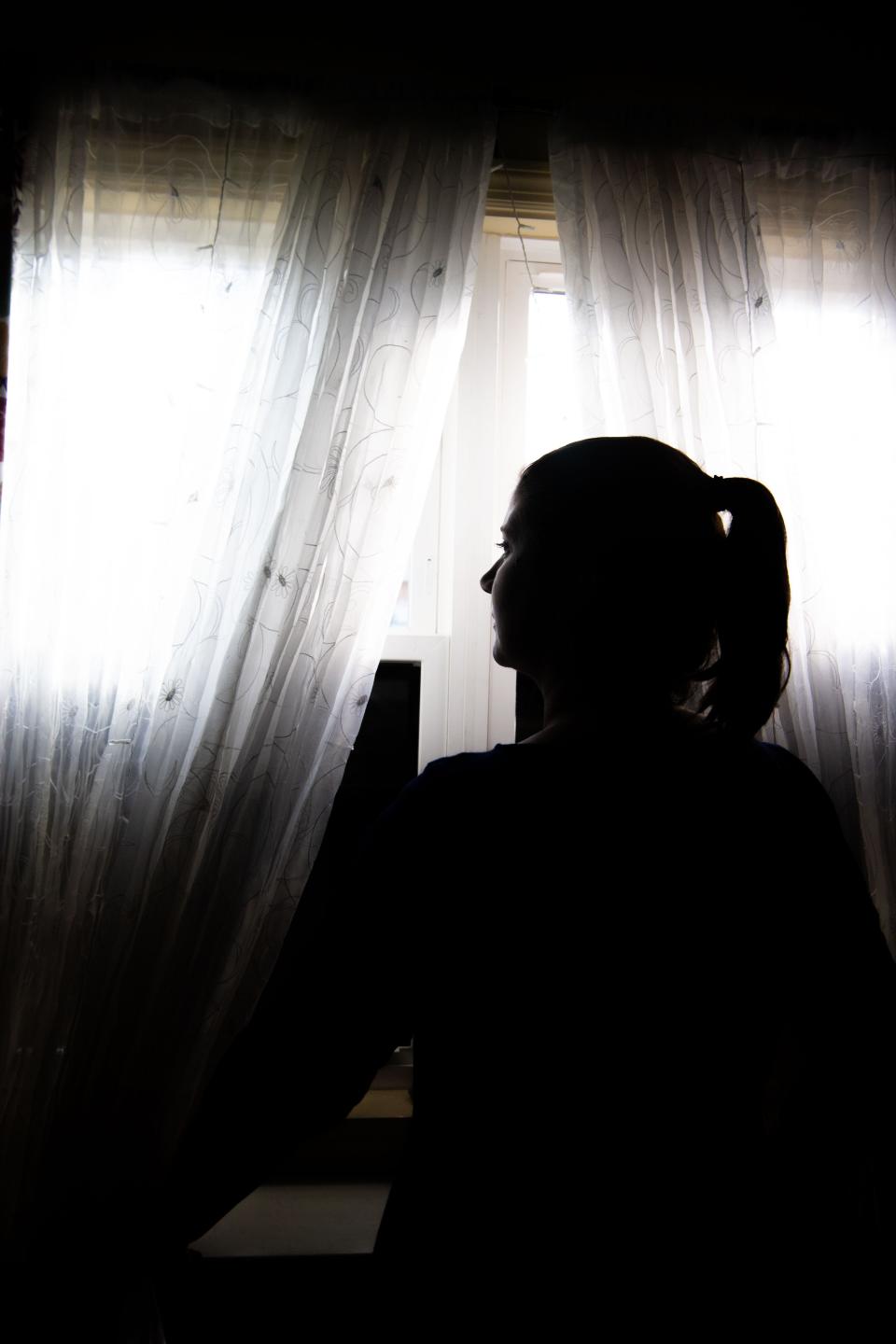
One of Alvandi's neighbors, Heather Smith, heard screaming. From her second-floor window, she saw Alvandi on the ground and Jenkins’ fist hit the right side of her face. Smith ran downstairs to help Alvandi while another neighbor called 911.
“I’ll fix you; it’s going to be a lot worse next time,” Jenkins said after assaulting Alvandi, according to court documents.
Alvandi is one of multiple women in Deaverview who are calling out a pattern of violence by people living off-lease with little to no consequences, and are demanding the Housing Authority of the City of Asheville, city leaders and law enforcement do more to protect them.
Some of the violent offenders have been banned from Deaverview but permitted to stay by a site manager who looked the other way, according to a former high-ranking housing authority staffer. This makes already vulnerable, low-income tenants feel trapped in their own homes and ignored by police and housing officials, they said.
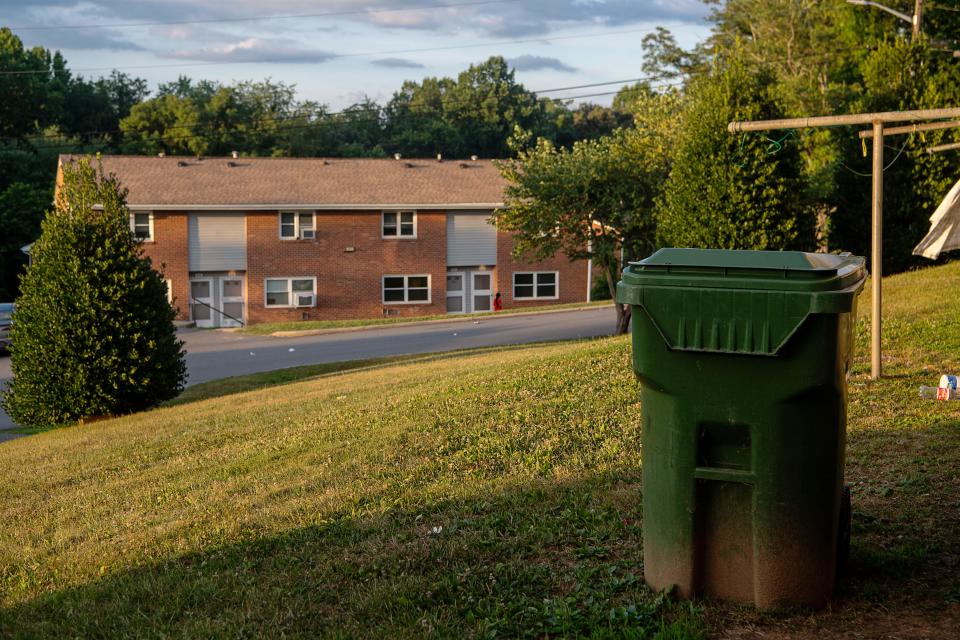
The Citizen Times spoke with these women over several months and is not naming some — including the former staffer — who said they feared further violent retaliation. Their stories come after a Citizen Times investigation found three of Asheville's public housing units had the highest rates of violent crime in the city. While Deaverview wasn't among those three, the neighborhood had 18% more gunshots over the past five years than did downtown Asheville, which is now receiving more City Council-approved, taxpayer-funded police patrols. Some Deaverview residents say crime — and police inaction — in their neighborhood have become intolerable.
More: Downtown Asheville not so dangerous? Data: These neighborhoods have more crime, violence
Fleeing domestic violence, revictimized in Asheville
Alvandi, 42, grew up in Massachusetts where she earned two art degrees at Wellesley College, got married and had a daughter. After fleeing years of domestic violence, she came to Asheville in 2017 to live near friends. Having little money, Alvandi qualified in 2020 to live in public housing. She was expediently placed in an apartment through Helpmate, a nonprofit that provides assistance to survivors of domestic violence like herself. She believed she would be safe in Deaverview.
But Jenkins was not arrested for months after the assault — the most common crime in public housing, according to Asheville Police Chief Mike Lamb. In the meantime, Alvandi and others frequently saw Jenkins around the 160-unit apartment complex, though he had been banned from all public housing property, according to court documents for a trespassing charge he received in late 2020.
“I should’ve beat you up. I just smacked you,” Jenkins called to Alvandi in a video she recorded in November, before he was arrested.
An arrest order was filed the day Jenkins assaulted Alvandi. Police officers interviewed both of them at the site, as Alvandi was still bleeding from her injuries. However, police did not arrest Jenkins until nearly two months later, according to court records.
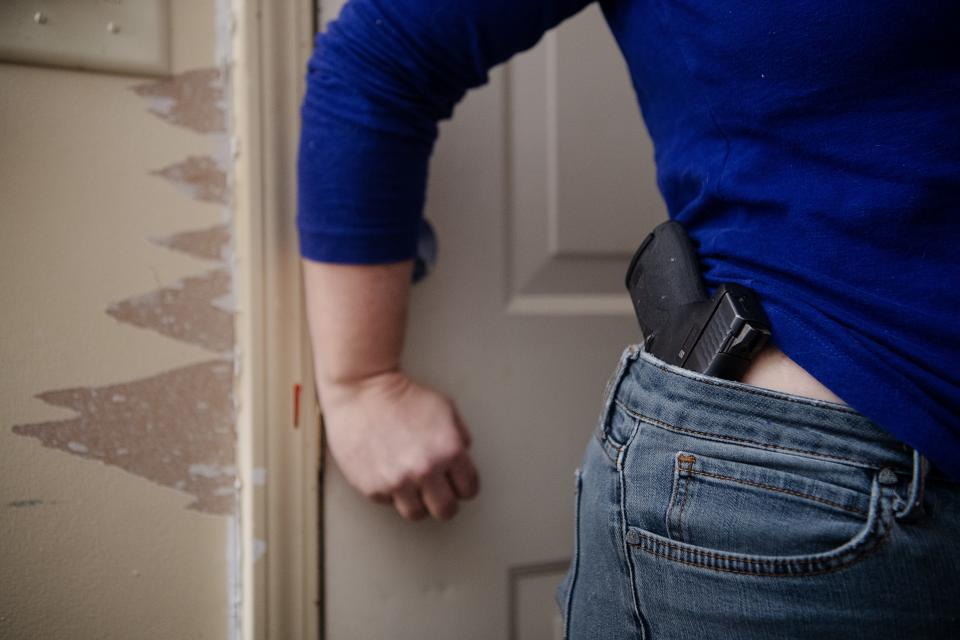
Jenkins bonded out of jail two days after his arrest and returned to Deaverview. Feeling trapped in her own home, Alvandi started to wear a registered handgun on her hip that winter. Five months later, Jenkins was charged with hit-and-run for striking Alvandi's car while she was driving near her home.
Alvandi, an artist who opened a studio in the River Arts District, said her "life has been brought to a halt where I've almost lost my livelihood."
More: After CT violent crime investigation, Asheville Police chief looks beyond downtown
APD Capt. Joe Silberman told Alvandi in a July 3, 2023 email that police couldn’t arrest Jenkins for failing to appear on the hit-and-run charge because APD couldn’t "see" the warrants for his arrest in their system. Lamb said that could have been an issue with the processing time it takes for a warrant to be verified in the court system and transferred to the system police use.
Wary that police did not seem to be moving quickly, the former housing authority staffer said they asked an APD officer after Alvandi's assault if Jenkins was a confidential informant.
The staffer was told: "I cannot confirm or deny."
"I really want to see the relationship between how the police and public housing handle these kinds of systemic problems investigated at a higher level because there's no accountability, or no consistent accountability to the law," Alvandi said.
"Certain people like Jeremiah Jenkins are given way too much power over the culture of public housing and use that power to abuse people that have a right to be here."
Assaulted with mirror, butt of rifle
Jodi Davis was walking into a Deaverview apartment in January when she said she was attacked by a man with previous charges for assaulting women on Deaverview property, according to court records.
After what she called a "normal conversation," he ran up the stairs after Davis, hitting her “over and over again,” throwing a mirror at her and striking her with the butt of a rifle. Four days later, bruises lined her body and broken glass littered the ground outside the apartment as she recounted the events to the Citizen Times.
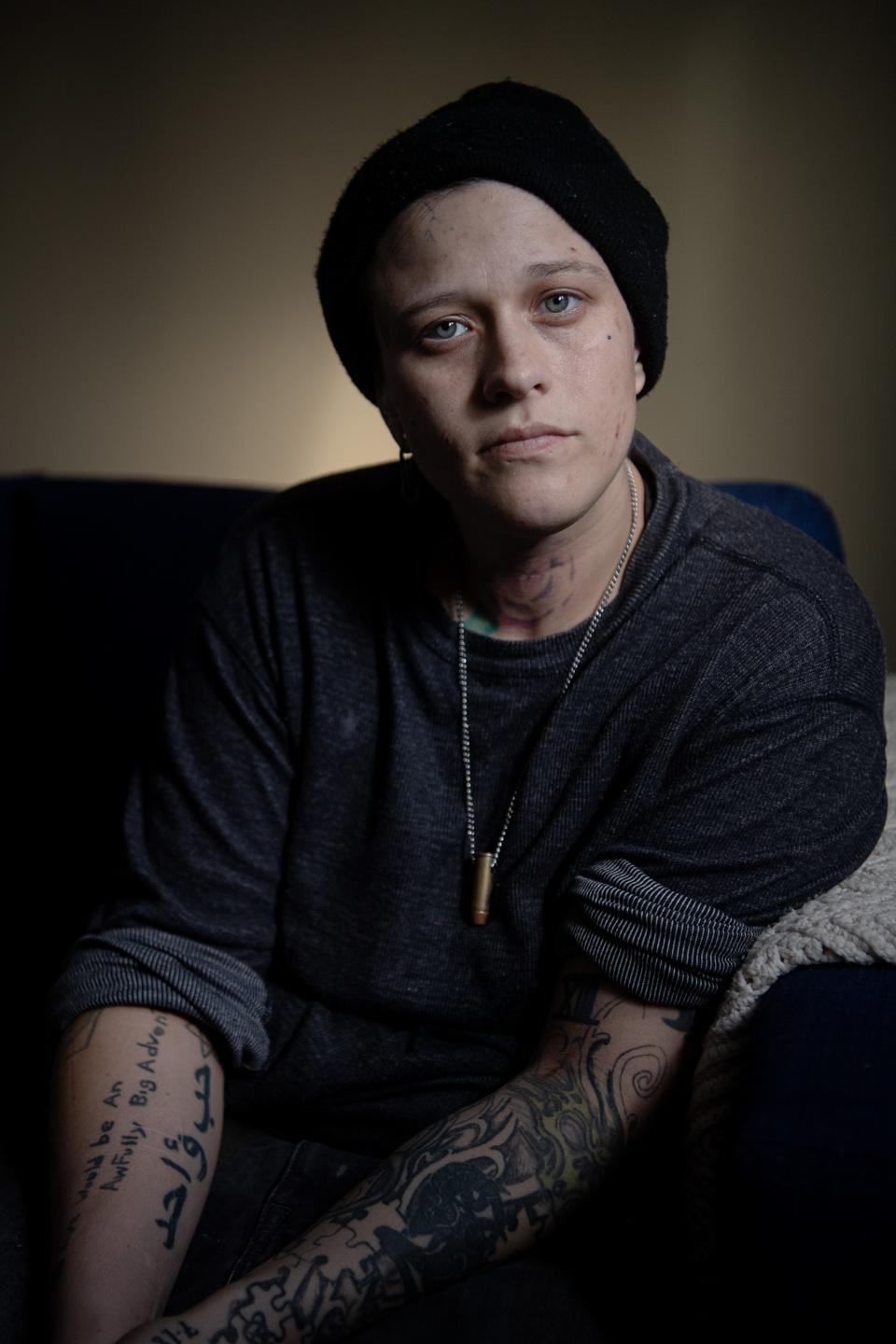
Davis said she saw him pull the rifle’s trigger, but the gun didn’t go off.
Davis called police that night, who responded but told her to file a police report or go to the magistrate’s office. She went to the magistrate three days later to get a warrant, but was told since there was a gun involved, the police would have to take out a warrant.
Police investigated but the case was closed without charges, according to police spokesperson Rick Rice. He said Davis was “advised of the steps to obtain a criminal charge on the suspect through a magistrate.”
Two months later, the same man barricaded himself in a Deaverview apartment with a woman he had “severely beaten” to the point of broken bones, Chief Lamb said. Hostage negotiators eventually talked him into surrendering.
“It doesn’t feel like people take it seriously, and nobody understands until they see it happen to them," Davis said.
Who’s responsible for residents’ safety?
“People fall through the cracks,” Heather Smith, the neighbor who witnessed Alvandi being attacked, said. “The police won’t come. Multiple times I’ve called, and they haven’t come, saying ‘you need to make a report.’”
“(The site manager) says ‘you got to call the police.' The police say, ‘you got to talk to the property manager.'”
Also while waiting for an arrest, Alvandi took photos showing then-site manager, Tammy Mohamed, walking past Jenkins and a highway patrol cruiser parked on Deaverview property in October 2022. Mohamed was later seen on surveillance footage smoking a cigarette with Jenkins outside Deaverview’s office "like they were friends," the staffer said.
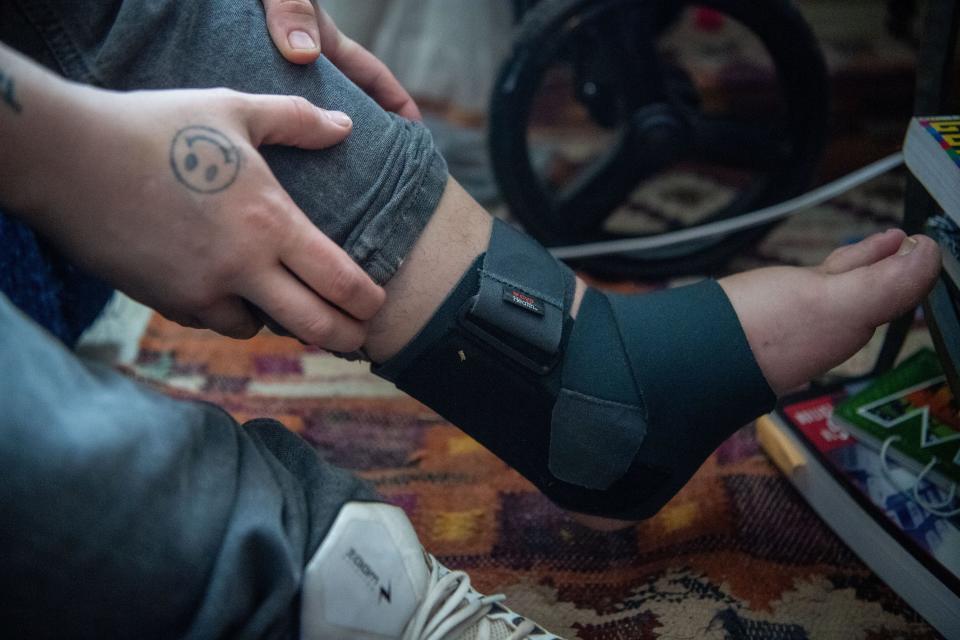
Multiple residents, some wishing to remain unnamed for fear of retaliation, said they emailed complaints to Mohamed’s superior over open drug use, threats and theft by a group of 10-20 people living in one apartment that Jenkins was known to frequent.
Jen Hampton, who represents the WNC Tenants Union and lived in public housing until last summer, said she's heard stories from other tenants and has her own experience with site managers who knew about people banned from the property but allowed them to stay.
The housing authority bans someone when staff are aware they committed or are being investigated for a crime within public housing "that impacts the quiet, peaceful enjoyment of our public housing site," Monique Pierre, CEO of the Housing Authority of Asheville, told the Citizen Times. Someone can be added to the banned list before they've been convicted of the crime.
The number of people on the banned list fluctuates month to month, with over 280 on the list in April.
Lamb told the Citizen Times in May that “it’s entirely possible” people on the banned list could be living in public housing neighborhoods, he says, due to communication issues, turnover within housing authority staff and the lack of a direct liaison between APD and HACA.
“Ultimately it’s incumbent upon housing staff and managers to cross reference that banned list, especially since housing maintains it,” Lamb said.
What does federal law say?
The U.S. Housing Act of 1937 establishes a federal commitment to provide “decent, safe and sanitary dwellings for families of low income.” The act also requires a plan be established by the public housing agency to “ensure the safety of public housing residents.”
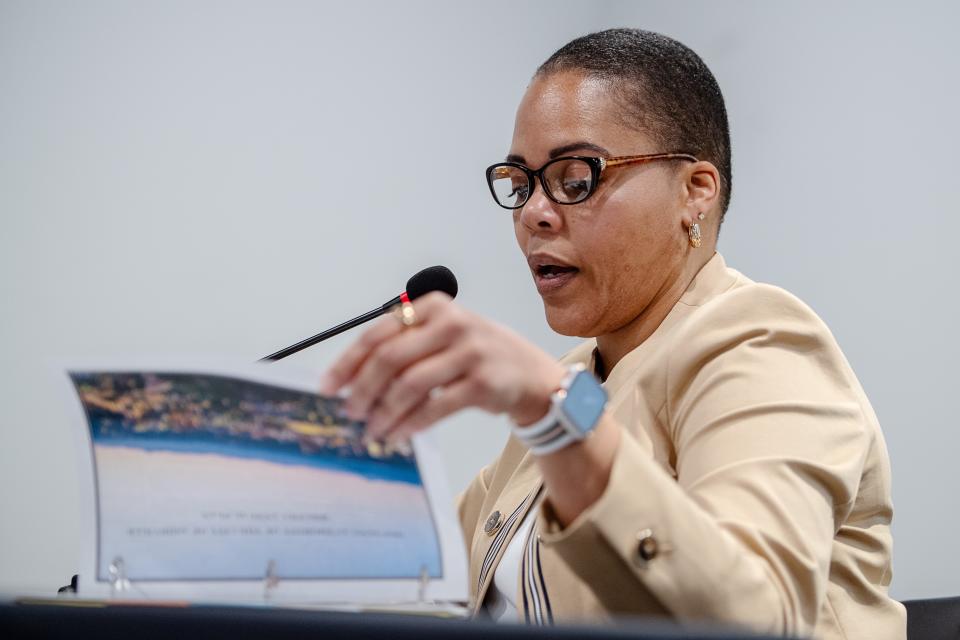
Asheville's housing authority manages federally subsidized housing for nearly 3,000 city residents in 11 communities: Pisgah View Apartments, Deaverview, Maple Crest, Hillcrest, Klondyke Homes, Livingston and Erskine-Walton, Aston Park Tower, Altamont, Bartlett Arms, Asheville Terrace and Woodfin Apartments.
Pierre, head of HACA since May 2023, told the Citizen Times May 14 that the only enforcement tool they have, other than calling police, is eviction. If someone banned is living in a resident's home, the housing managers can ask them to leave, call 911 and send a lease violation or letter of eviction to the resident they are staying with. The authority can also offer an emergency transfer to a resident who's been victimized or feels unsafe.
More: Asheville homicide victim identified by police; juvenile suspect charged with murder
"My managers are public housing managers. They are not law enforcement," Pierre said. "We have no obligation to go out and put our staff in danger for anything. We call the police when we need a response."
Scott Holmes, a senior clinical professor of law at North Carolina Central University who specializes in criminal procedure and fair housing, also said the housing authority's "only remedy when there’s someone who’s threatening is to have them removed from the property by police," either through eviction or issuing trespass notices.
“They have an affirmative obligation to do those things, though, so if they’re aware of threats to residents and they don’t take those actions, then they are in violation of HUD regulations that require them to try to maintain safe premises," Holmes said.
“Neither side seems like they are doing what they should to protect people from a very basic thing, like not getting beat up, shot or harassed."
The former housing authority employee agreed that HACA isn't doing enough to protect residents from imminent harm. They said part of the issue is that site managers they've worked with are too scared to walk their properties. Banned or violent people, they pointed out, don't go into site offices — except Jenkins, "who was smoking cigarettes on the front porch of the place."
More: Asheville leaders react to high neighborhood violence data: 'Not treating with urgency'
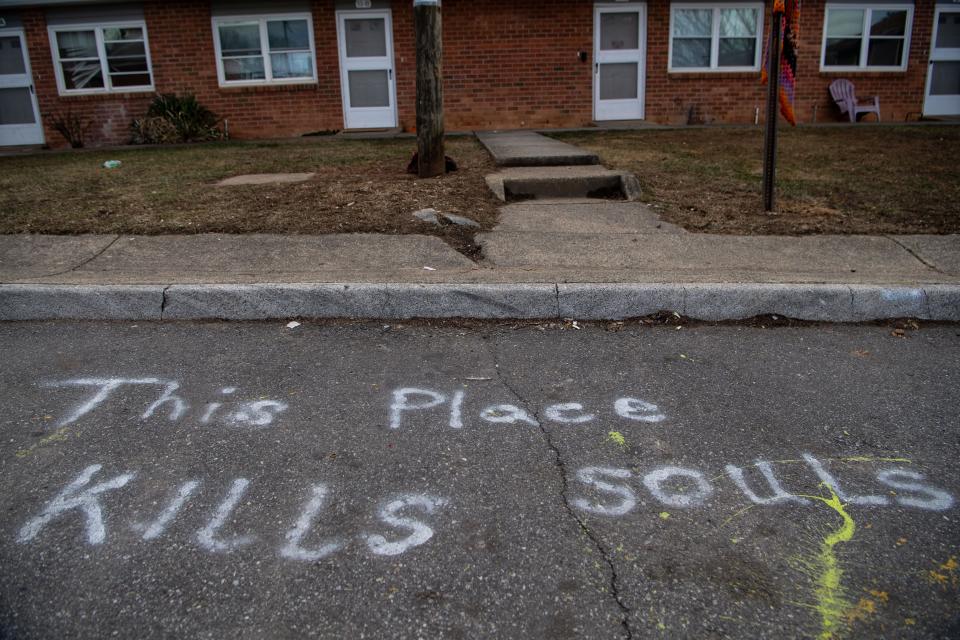
'Doesn't feel safe for me and my kids'
Two doors down from Alvandi, Ayla Talley was standing outside her back door when she saw a pregnant woman, 24-year-old Tiyquasha Simuel, shot and killed in June 2019. Two weeks before, Simuel testified against Nathaniel Dixon, who was convicted of the first-degree murder of his pregnant girlfriend, Candace Pickens. Five years later, APD is still investigating Simuel's death.
Now, after numerous issues with a neighbor, whom Talley has a 50C restraining order against and who's previously been on the banned list, Talley is looking for a new place to live for her and her 3- and 5-year-old children because it “doesn’t feel safe for me and my kids,” she said. But she hasn’t been able to afford most places. Average rent for a two-bedroom apartment is $1,680 a month in Asheville.
In April, Asheville police investigated three drive-by shootings at public housing complexes occurring within 48 hours of each other. The first shooting was at Pisgah View Apartments in West Asheville shortly after midnight April 7. Four hours later, there was a shooting at Deaverview Apartments. Then that evening, there was another shooting at Pisgah View.
“There’s so much stuff that goes on in Deaverview that I feel like nobody’s safe in here because of the number of gunshots that happen on a regular basis,” Talley said. “When you call the police, sometimes they’ll come and sometimes they won’t, depending on the case.”
From 2018 to 2023, there were 124 gunshots and gunshot wounds reported in or directly adjacent to Deaverview, according to police spokesperson Samantha Booth. That's 18% more than the 105 reported in downtown in that same time period, which covers a much larger area including the neighborhoods of South Slope and the Block, as the Citizen Times previously reported. However, it's fewer than reported in Pisgah View or Hillcrest, which had 258 and 152 calls, respectively. The populations in these public housing sites also historically have high numbers of children.
Residents who feel they are being ignored follows a historical pattern of public housing communities being overpoliced for drug crimes but underpoliced for violent crimes or lacking a police response at all, according to Holmes.
“That leads to a history of people in the community not feeling safe from the police because they are there to engage in a war on drugs,” Holmes said. “It undermines confidence in police in those communities, and when they are actually harmed, they don’t get a response that actually keeps them safe.”
'Hell in a handbasket': In aftermath of a cut police unit, what are next steps?
“It was problematic in Deaverview especially, like this is going to hell in a handbasket real fast,” the former HACA staffer said.
Facing police turnover, APD cut its public housing authority unit in 2022. That unit had an officer assigned to each property, who built relationships with residents and was the police liaison for local property managers, Lamb said.
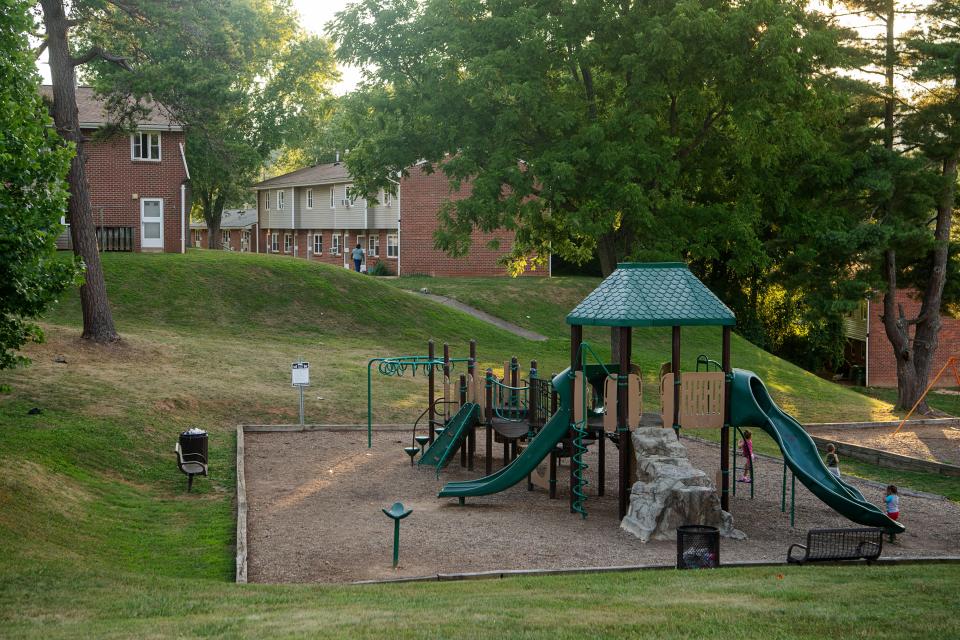
When the police unit was cut, housing sites started getting a law enforcement response from variety of agencies: from police, the Buncombe County Sheriff’s Office, even N.C. State Highway Patrol.
"(Drug dealers) are back on the corner, they're flagging down your cars. They know there's a problem with policing; they know there was a last time they got away with it," the former HACA employee said.
To bring back the housing unit, Lamb said, “I just need more people.” But, he conceded, it falls below others on the list of staffing priorities.
After filling the patrol, detectives and traffic safety divisions, Lamb said the next priority “depends on where data and crime point us as far as where is the highest crime location, where’s the most dangerous location, in regard to either filling back the housing unit or the downtown unit."
Meanwhile, heated public discourse over Asheville's downtown — with merchants, downtown-oriented groups and local and national media who say the city center has become intolerably dangerous — was followed by an increase in police presence, the addition of deputy patrols, private security guards in city parking garages and the allocation of other taxpayer resources to downtown.
In 2023, APD officers spent nearly 4,400 hours on officer-initiated calls downtown, 1,600 of which were specifically for conducting crime prevention measures, according to police data. In all of public housing combined last year, officers spent 766 hours on officer-initiated calls, 173 of those hours specifically going to crime prevention.
“What the community really needs if they’re trying to reduce violence are meaningful, targeted responses to violence in communities that are suffering from violence," Holmes, the law professor, said.
More: Asheville Housing Authority passes budget to hire off-duty law enforcement
“I have a lot of faith in our chief to try to find the right balance," Mayor Esther Manheimer said June 24 regarding whether police should spend more time focused on public housing.
Manheimer said tenants getting caught in the cracks between housing and police is an ongoing concern she's heard from community members "over the years," and she doesn't want one community to suffer over another.
“We’ve had a lot of leadership change with a new chief of police and at the Housing Authority, so I think there is an opportunity to forge a stronger relationship there," Manheimer said.
Antanette Mosley, HACA's liaison to City Council, did not respond to numerous calls and emails for comment over several weeks.
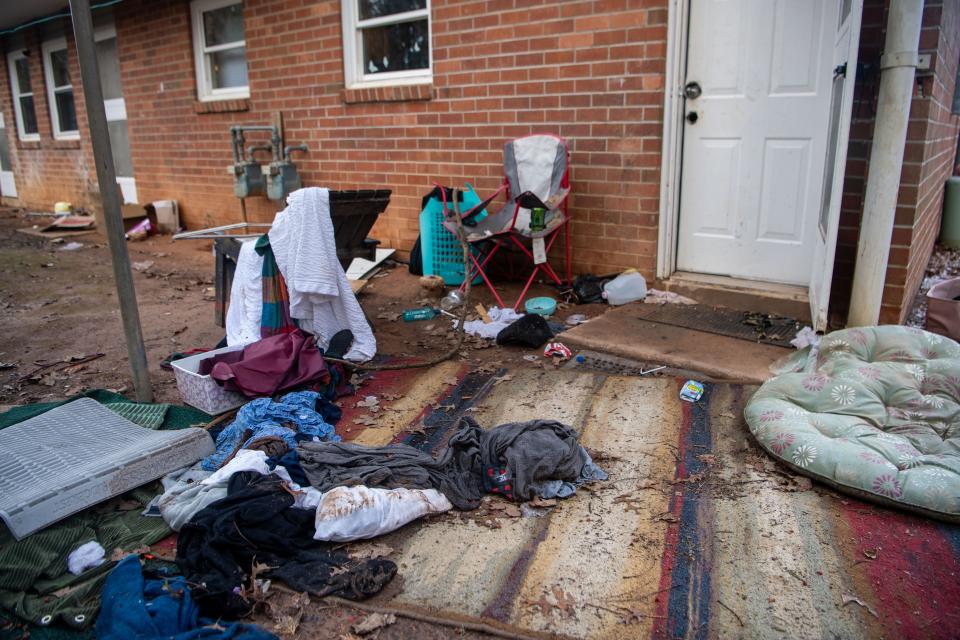
Pierre mentioned the Downtown Safety Initiative, which first started the downtown-focus for law enforcement, calling it "brilliant and targeted and important."
"So, I'm thinking we need them to come do that over here. But how?" Pierre said.
She said the police department has been responsive and willing to partner, but they first need to work on relationship building to "reestablish the 'comfortability' of APD to feel welcome back to our properties, as well as the sheriff's office to be welcomed at our properties."
Pierre also suggested establishing resident councils at each site. That group would elect a president to bring their property's concerns to HACA's Board of Commissioners on a resident advisory board.
More: Asheville Southside Community Farm staff told they 'cannot be' on property after 2024
Manheimer, legal expert Holmes and the former high-ranking HACA employee all said it takes proactive approaches from groups on all sides of the problem – social workers like Helpmate, pro se attorneys like Pisgah Legal, childcare development programs like Head Start – to see real, lasting change to the high rate of violent crime in public housing and to ensure victims, like Davis, know what resources are available to them.
"Other systems are failing at the same time for these folks, and so the real solutions have to be inter-systemic," Holmes said.
Alvandi said she's trying to earn enough money as an artist to move out of public housing but is struggling to pay her medical bills from the assault and her car insurance premium "sky-rocketed" after the hit-and-run. For months, she strained to pay her "very affordable" rent while feeling like she couldn't safely leave her house, she said.
"I’d like the Housing Authority to operate like a professional organization that prioritizes serving it tenants, instead of protecting site managers who protect people on the banned list engaged in violent and organized crime against some of their most vulnerable tenants." Alvandi said.
"The corruption is so widespread, it’s hard to understand how it’s allowed to continue. I’d like to see an audit of the Housing Authority, in terms of financials and federal compliance."
Need Help?
Buncombe County Family Justice Center is an all-in-one service for victims of domestic violence, sexual assault, and elder abuse. They can be reached at 828-250-6900.
Our VOICE has a 24-hour sexual violence crisis line. They can be reached at 828-255-7576.
Helpmate has a 24-hour domestic violence crisis line. They can be reached at 828-254-0516.
Pisgah Legal Services offers free or low-cost legal advice to low-income clients regarding civil cases. They can be reached at 828-253-0406.
Mobile Crisis Hotline is 24-hour support for persons in crisis. They can be reached at 888-573-1006.
Ryley Ober is the Public Safety Reporter for Asheville Citizen Times, part of the USA Today Network. Email her at [email protected] and follow her on Twitter @ryleyober
This article originally appeared on Asheville Citizen Times: Victims decry violence in Asheville public housing neighborhood
